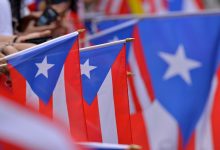Eighteen months after Hurricane Maria hit the small Caribbean island nation of Puerto Rico – one of thirteen “unincorporated territories” of the United States – its government has passed a bill to move the island to 100 per cent renewable energy by 2050, and it is expected that the governor will sign it within a month.
Puerto Rico joins a growing list of US states and regions committing to transition to securing 100 per cent of their electricity from either renewable energy sources, or the less strict “clean energy” sources (which include technologies such as nuclear).
The 100% renewable bill passed Puerto Rico’s Senate earlier this month, and passed through the House of Representatives this week, joining US states such as Hawaii, Washington DC, California, New Mexico, Wisconsin, Minnesota, and Illinois, and a host or cities and municipalities.
Puerto Rico’s plan – which has been sent to the Governor’s desk and is expected to be signed within the month – calls for 100 per cent renewable energy to be secured by 2050, with incremental milestones set for 2025 and 2040.
The plan also bans coal after 2028 – which is not nothing, considering that coal provided 17 per cent of the island’s electricity in 2017, while renewable energy only provided 2 per cent.
In the wake of the devastating Category 5 Hurricane Maria’s track across the country in September 2017, the value of renewable energy – solar in particular – has risen dramatically, following an island-wide blackout, the longest blackout in US history, and one virtually ignored by Washington.
In that time, solar companies such as Sunnova, Tesla, and Sunrun moved in, offering solar for state-run infrastructure – such as hospitals and sewage treatment plants – and residents alike.
Solar, especially when coupled with storage, provides island nations prone to damaging storms such as Puerto Rico – a likelihood which will only increase as climate change progresses – provides stable power generation.
“Policymakers have listened to the solar and storage industry leaders’ input every step of the way while developing this historic legislation,” said PJ Wilson, President of Solar and Energy Storage Association of Puerto Rico (SESA-PR).
“SB 1121 eliminates many of the barriers that have frustrated solar deployment at all levels for years and creates a clear vision for ramping up clean energy, but actually implementing the law will require strong continued collaboration as Puerto Rico’s power grid transforms from 97% imported fossil fuel dependence to 100% local clean energy.”
A draft plan proposed by the Puerto Rico Electric Power Authority (PREPA) earlier this year called for a mammoth build-out of solar and battery storage and the development of mid-sized regional grids which would be interconnected but capable of functioning independently in the event of another storm.
“After Hurricane Maria, a new consensus was really built in Puerto Rico,” said Javier Rua-Jovet, director of public policy in Puerto Rico for Sunrun. “Everybody knew that a different system had to be built.”
“Since it’s bipartisan, one can really bet on its stability as a policy in the long run,” Rúa-Jovet added. “That’s great for markets and signals to investors and new entrants.”
“Today is a win for all Puerto Ricans,” added Lynn Jurich, CEO and co-founder of Sunrun, the nation’s leading residential solar and energy services company.
“Leaders like Governor Rosselló have embraced clean energy technology like home solar and batteries ever since the deadly hurricanes in 2017 devastated the island and its entire electricity grid.
This critical legislation will create local jobs, grow the economy, and enable even more Puerto Ricans to have access to clean, resilient, reliable energy for their homes.”
“We congratulate Puerto Rico’s legislature for passing this historic bill,” said Abigail Ross Hopper, president and CEO of the Solar Energy Industries Association.
“Utility scale and distributed solar energy will create jobs, fuel the economy and provide much needed security and reliability to Puerto Rico’s power system. And that in turn will reduce dependence on old infrastructure and fuels that must be transported from overseas.”










